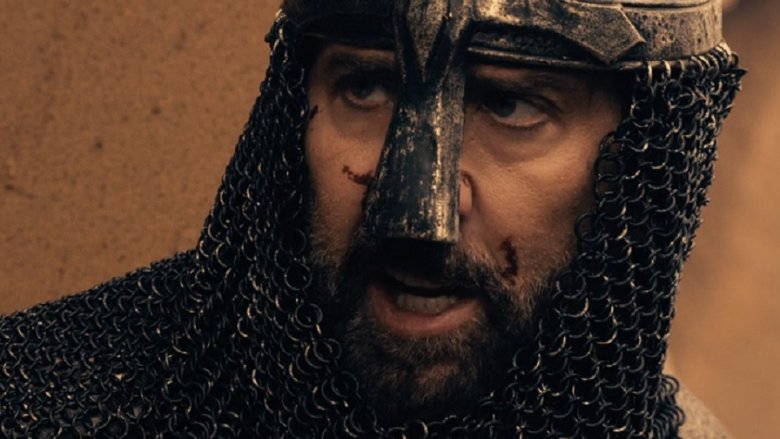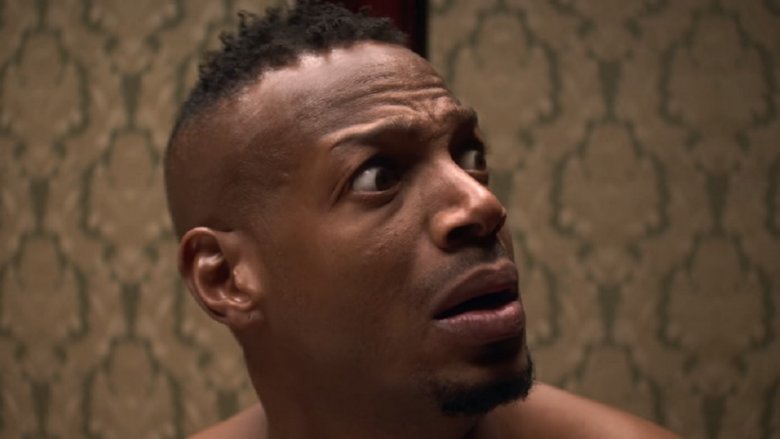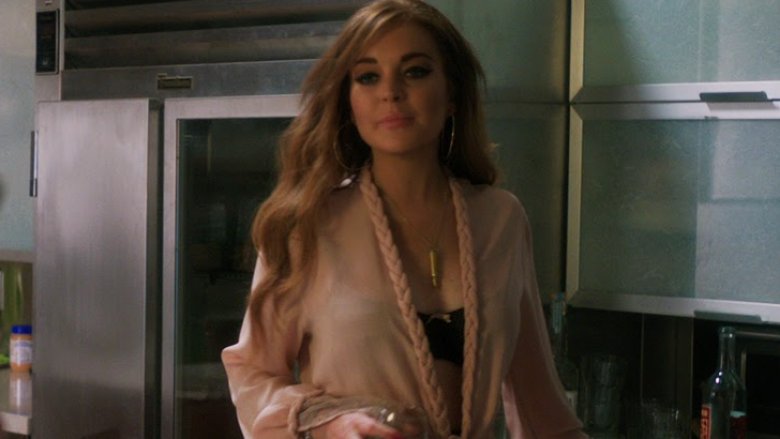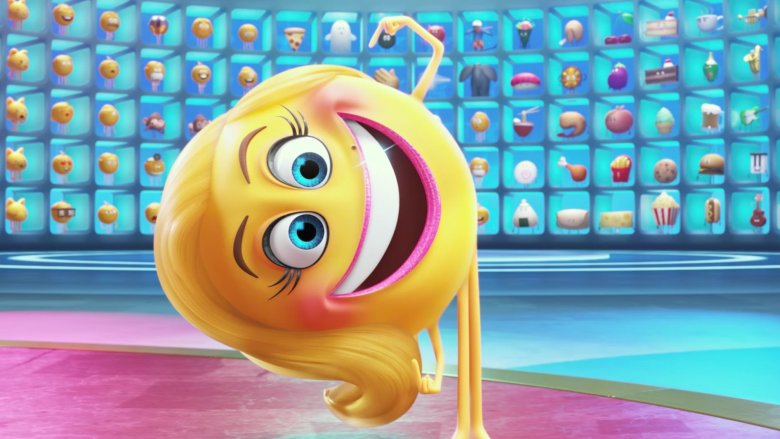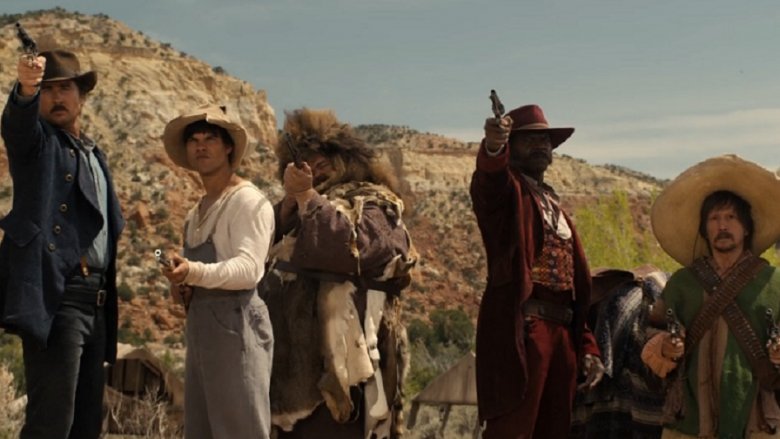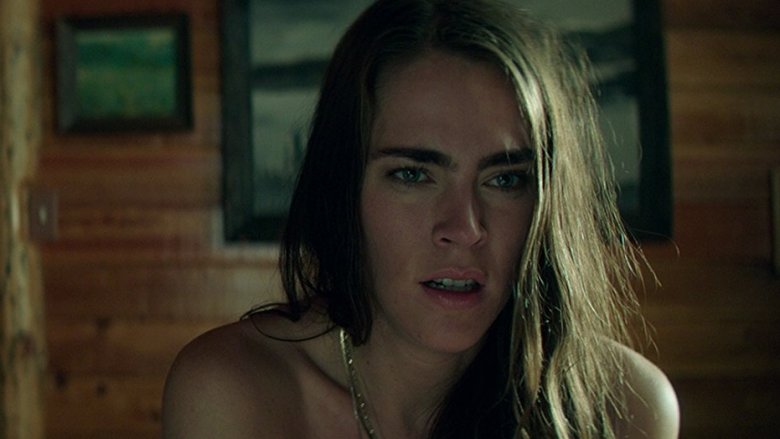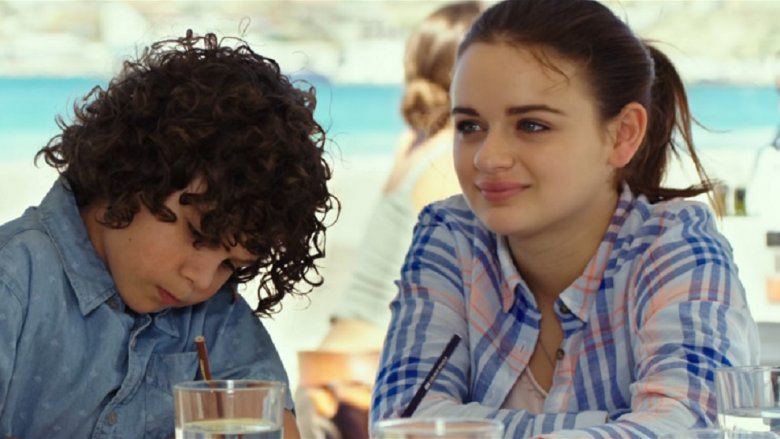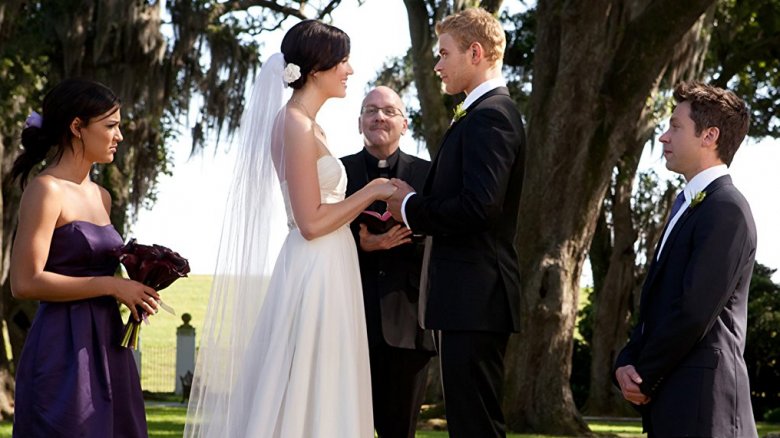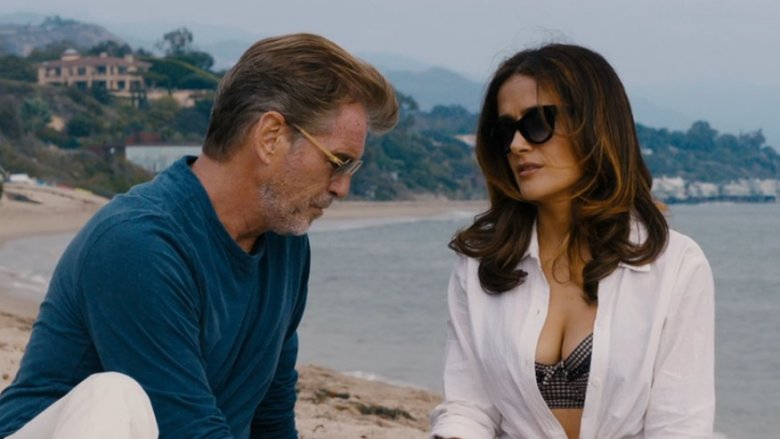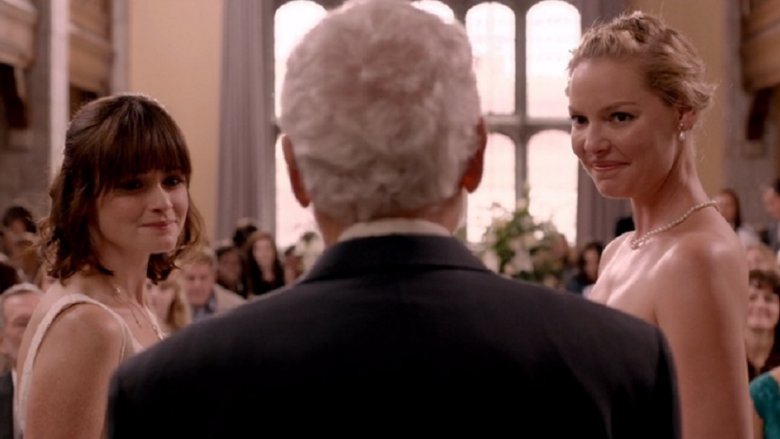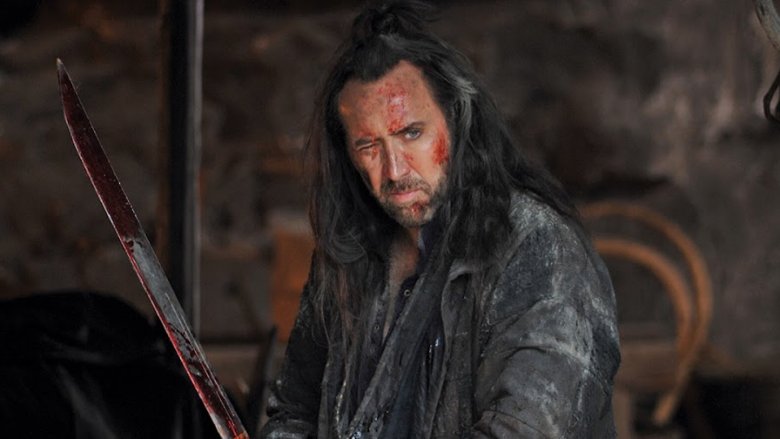The Worst Movies On Netflix Right Now
Netflix has provided us with a ton of variety in our viewing choices, but sometimes this can be a double-edged sword. On the one hand, they give us yearly doses of acclaimed series like Bojack Horseman and Orange is the New Black while pumping a steady flow of new movies into their ever-revolving queue. On the other, the law of averages dictates that a whole lot of those movies are going to be complete garbage. Trying to find something new, awesome, and stimulating to watch can start to feel like hunting for the proverbial needle in a haystack.
Fortunately, we can save you a little time. These are films that should be treated with a healthy dose of skepticism whenever the streaming service recommends them for you — unless, that is, you're into movies that really, really stink. They're not guilty pleasures, they're not "so bad they're good." They're simply the most ill-conceived, poorly executed, flat-out terrible films Netflix has to offer.
Naked
There was a time when the Wayans brothers could be relied upon to bring the funny. But when the 2000s arrived, they began aiming squarely for the lowest common denominator with cinematic travesties such as the Scary Movie series and the oft-maligned White Chicks (though the film did sport a talented list of cast members). While Keenan Ivory, Shawn and Damon followed up that decade by largely dropping off the face of the Earth (Damon's recent return to TV in Lethal Weapon notwithstanding), Marlon has continued laboring on in the kinds of starring vehicles destined from the outset to find their places on lists like these.
The Netflix original film Naked continues his dubious streak with a story that can quite accurately be described as "Groundhog Day, except the guy is naked." The fact that Naked is not, in fact, A Haunted House 3 was perhaps the only positive aspect of the film observed by any reviewer; lowbrow, lightweight and so very boring, Naked is a film that comes very close to cheapening its "inspiration" with its very existence.
The Canyons
He may not be exactly a household name, but Paul Schrader's contributions to cinema are impossible to overstate. He wrote Taxi Driver and Raging Bull, and as a director, he's given us classics like American Gigolo, Affliction and the recent First Reformed. But when Schrader whiffs, he whiffs really, really hard, and there's no better evidence than 2013's The Canyons. When the famously erratic Lindsay Lohan is the best thing about your movie, you're almost certainly in big trouble, and not even a screenplay by the notorious provocateur Bret Easton Ellis (author of the novel American Psycho) could snatch this film from the jaws of pointlessness.
USA Today's review praised Lohan's "flashes of vulnerability amidst vacuous moments" while flatly dismissing the efforts of the remainder of the cast, who "might as well be mannequins." Los Angeles Times' Kenneth Turan wasn't even feeling that charitable: "If the creation of self-important tedium were a competitive sport," he wrote, "The Canyons would take home the gold... It's as though the absence of convincing emotion is a sought-after virtue, as if genuine feelings are too yesterday to interest serious artistes. The Canyons is a bad accident everyone saw coming." The few positive notices cited Lohan's believability as a drug-addled fallen starlet (which doesn't seem to be too much of a stretch), but they were few and far between. Most agreed that the only valid reason for viewing it is if you just want to feel awful.
The Emoji Movie
The Emoji Movie was an idea that sounded terrible on paper, so nobody was too surprised when it was terrible on screen, too. Despite the inexplicable presence of an A-list voice cast including Anna Faris, Sofia Vergara, Maya Rudolph, James Corden and Sir Patrick Stewart (hitting either a career low or high as the voice of the poop emoji), The Emoji Movie is a boring, unfunny, incompetently edited mess that may qualify as the biggest waste of talent this side of Movie 43.
Many critics rightly declared the film a cynical cash grab and a "metaphor for a Hollywood that is struggling to find the line between branding that audiences love and branding that audiences resent," but some were offended on an even deeper level. TimeOut's review posited that the movie's message is far more insidious than it appears on the surface, saying, "The Emoji Movie openly rolls its eyes at full-fledged thought, legitimizing poor communication skills by cheering on the decay of attention spans. Early on, a character gleefully declares, 'Words aren't cool!' Is that the ideology the screenwriters embraced? It's a fair question." From the dialogue to the jokes to the startlingly ugly animation, there's no aspect of the film critics didn't find time to trash, but Film Ireland Magazine's Michael O'Sullivan offered up the most succinct assessment: "To put it in the film's own terms," he wrote, "The Emoji Movie is one big pile of Patrick Stewart."
The Ridiculous 6
Adam Sandler's career started off promisingly enough, but these days, it's tough to find a critic who considers him to be anything other than a blight on modern comedy. Since his commercial peak in the '90s, Sandler has put together such an astonishing string of terrible movies that it almost seems like this was his plan all along. The Netflix original The Ridiculous 6 — one of the most maligned releases of 2015 on any platform — only seems to prove it.
The Western "comedy" raised red flags even before its release. Reports hit that several Native American actors had walked off the set because of its racist overtones, and Sandler's assurances that the "pro-Indian" movie (his words) would allay any suspicions of racism upon its release did not pan out. The Wrap's Deborah Day flatly called it "everything wrong with Hollywood for the past two decades... example A of why the Hollywood machine needs more diverse voices." She added: "Adam Sandler needs an intervention." When not trafficking in "violent, crass, demeaning stereotypes," the movie was taken to task for its abundance of "juvenile and gross, unsophisticated and insensitive" gags, which is really par for the course for Sandler at this point. Not even a game cast including Luke Wilson, Steve Buscemi, and Terry Crews could save the project from Sandler and frequent collaborator Tim Herlihy's terrible script. What's really remarkable is that they even tried.
Cabin Fever (2016)
Cabin Fever from 2002 isn't exactly a horror classic, but it was a fairly well-received, nasty little shocker that announced the arrival (for better or worse) of controversial schlockmeister Eli Roth. For some bizarre reason, Roth decided in 2016 to produce a nearly shot-for-shot remake of his 14-year old film. The remake was shot using Roth's original screenplay, and directed by veteran set designer (and novice director) Travis Zariwny. The result is one of the most purely inessential films ever made, a tired reworking by less-talented individuals of a pretty-good film that never merited a remake in the first place.
Zariwny drew plenty of fire for being even more artless in his staging and exercising even less restraint than Roth (which is saying something), and there was near-universal puzzlement over why the film was even made: "Scene for scene, line for line, gag for gag," wrote A.V. Club's A.A. Dowd, "it's basically the same movie. And the original was no masterpiece to begin with." The 2016 edition of Cabin Fever failed to draw a single positive review, and its pitiful box office and home video take should ensure that it's an experiment that won't be repeated.
The Kissing Booth
This much can be said about The Kissing Booth: it is a bonafide hit. Its young stars Joey King (Ramona and Beezus), Joel Courtney (Super 8) and Jacob Elordi (Swinging Safari) have been regularly mobbed by teenage fans since the film's release, and Netflix chief content officer Ted Sarandos called the film "one of the most-watched movies in the country, and maybe in the world." It's one of very few Netflix original films to become a genuine cultural phenomenon — despite the fact that, if the critics are to be believed, it's also genuinely terrible.
The film's simple love triangle story may have struck a chord with young people the world over, but reviewers have near-unanimously blasted it as a film that has no idea what it wants to be. The film's terminal case of tonal whiplash was called out by more than one observer, as it shifts radically from "quirky teen comedy" to "melodrama working with mature themes" at the drop of a hat. Problems with pacing and editing only serve to highlight the film's bizarre shifts in tone — but nobody ever said a movie had to actually be good in order to become a cultural phenomenon.
Love Wedding Marriage
Dermot Mulroney's directorial debut Love Wedding Marriage is a film with systemic issues, beginning with its nonsensical title. The story of a marriage counselor (Mandy Moore) whose own marriage is threatened by the impending divorce of one of her clients certainly appears to be straightforward rom-com material, and it's not as if Mulroney doesn't have experience in that area. But even with a stellar cast including Josh Brolin, Kellan Lutz, and Jane Seymour, Mulroney turned in a piece of work which strongly suggests that he should have stayed in front of the camera.
Critics were quick to call out his "ham-fisted direction" as chief among the film's problems, but they don't stop there. FilmJournal pegged it as a "Fairly excruciating romantic comedy distinguished by its total lack of romance or comedy," while Slant's Kalvin Henely was even less kind, saying, "Mulroney... imbues the movie with his own lack of craft and inventiveness, [and] the script... feels like it was written by people who were born yesterday, lacking any awareness of its triteness." Plenty of scorn was reserved for the acting (with the exception of Brolin, a lone bright spot) as well as the editing, cinematography, and... well, everything else. New York Times' Jeanette Catsoulis summed it up by feeling the pain of her fellow reviewers: "If there is a special hell for film critics," she wrote, "it probably has movies like Love, Wedding, Marriage on continuous rotation."
Some Kind of Beautiful
The romantic comedy genre as a whole hasn't exactly been lovingly embraced by the critical community, but Some Kind of Beautiful — from director Tom Vaughn, a reliable helmer of extreme clunkers for the last decade — appears to have been specifically calibrated to stoke critical ire. With haphazard writing and by-the-numbers plot, the film's tone-deaf attempts at comedic payoffs tend to register as simply offensive.
Pierce Brosnan stars as a seduction artist caught between two half-sisters, played by Salma Hayek (14 years his junior) and Jessica Alba (28 years his junior). Brosnan dutifully plods through every character beat we've come to expect in service of a film the New York Times' Stephen Holden called "the kind of embarrassment a studio dumps into the market in August while hoping no one will notice." Toronto Sun's Liz Braun pointed out that the film "wants to be light farce, all repartee and two-dimensional characters; other times it wants to be a contender, with deathbed scenes and motivating lectures on romantic poetry. At all times it's a tremendous waste of talent." Slapdash editing and amateurish pacing don't help matters — Holden complained that the 99-minute film "seems to last for three hours" — but it could have been worse. For its U.K. release, the film was titled How to Make Love Like an Englishman. Yikes.
Jenny's Wedding
Same-sex relationships have gotten short shrift in the rom-com world, even as they would seem to offer myriad new storytelling opportunities for a genre that's gotten a bit stale. Love, Simon from 2018 is a fine example of how such an effort can go right. But for an example of how it can go dreadfully wrong, look no further than the 2015 Katherine Heigl vehicle Jenny's Wedding. Chief among the film's problems: Heigl and co-star Alexis Bleidel (The Handmaid's Tale) simply aren't believable as a gay couple. But even if they were, the film's ultra-trite script and strangely backwards views on marriage don't do this allegedly progressive rom-com any favors.
Aaron Hillis of the Village Voice called it out for this reason, saying the film "harps on the retrograde ideas that women should all aspire to be married, and happiness is a permanent state of being that the virtuous can achieve." New York Daily News' Katherine Pushkar panned the film as simply being "outdated, simplistic and insulting to both the characters and the audience," while Noel Murray of A.V. Club opined that it "would've been the hippest gay-themed indie of 1995" before going full-on Ebert: "This is a movie displaced in time. And it's barely a movie. It's more like a dusty, faded old pamphlet: 'So your daughter's decided to get gay-married...'"
Outcast
Nicolas Cage has had a great run of late with acclaimed roles in the thrillers Mom and Dad and Mandy. But if there's one recent outing he'd probably like us all to forget, it's the bizarre 2015 period piece Outcast. Cage co-stars with Hayden Christensen as warriors caught up in the machinations of two princes in 12th-century China. And if you find it a little odd that their roles were filled by white actors, well, you're not alone.
The film got the requisite amount of grief for that questionable casting choice, but it was far from the only complaint critics had. Boon Chan of Singapore's Straits Times found it "bizarre that this Chinese-French Canadian production would be so tone-deaf and insensitive." But he also took serious issue with the loopy, contrived plot and the acting of Cage in particular ("Cage can look forward to yet another Razzie nomination for his fine work here.") The fact that everyone speaks English in a film set in China and intended mainly for the Chinese market also puzzled more than one observer, and the film's leaden direction (courtesy of stuntman Nick Powell) and boring action sequences received plenty of jeers. It all adds up to a complete waste of time, perfectly summarized by Pajiba's Rebecca Pahle: "a boring story told by staggeringly bad actors... spouting wooden lines of dialogue."
In other words...this is one of the worst movies you'll see on Netflix now...or, really, ever.
